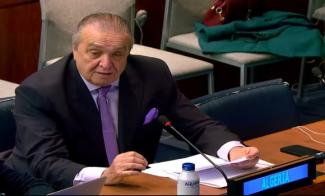
New York (United Nations), 16 October 2024 (SPS) - Algeria's Permanent Representative to the United Nations, Ambassador Amar Bendjama, called on Wednesday from New York, for international equality and justice regarding the decolonization of Western Sahara
Addressing the Fourth Committee, responsible for special political questions and decolonization, Ambassador Bendjama strongly called for the right of the people of Western Sahara, the last colony in Africa and the largest occupied territory in the world, which has been on the UN agenda since 1963, to self-determination.
The Algerian diplomat used an irrefutable legal argument, first relying on the "highly historic" development that occurred in this matter barely two weeks ago, precisely on October 4, which "added to the legal foundations of the Western Sahara issue," namely the final and unappealable ruling of the Court of Justice of the European Union on the issue of Western Sahara and the European Union-Morocco trade agreements regarding fishing and agricultural products.
In this regard, he highlighted two unchangeable foundations that were established by this ruling.
The first is that "Western Sahara is a distinct territory from Morocco, and its status is a decolonization issue."
The second is that "The Polisario Front is the legitimate and exclusive representative of the Sahrawi people."
Beyond the significant legal, judicial, and political importance of this latest ruling, there are lessons we must reflect on today. He noted that this is "a ruling of consistency," and that on the issue of Western Sahara, the expression of international legality has always been clear, strong, and immutable.